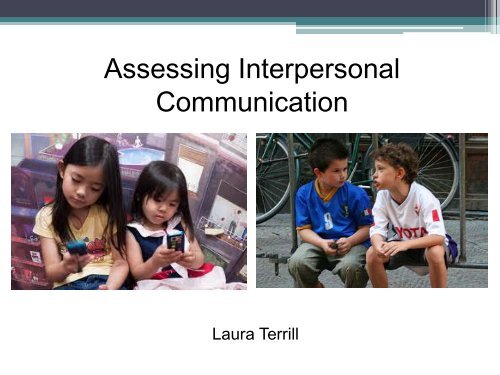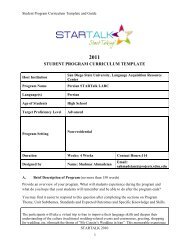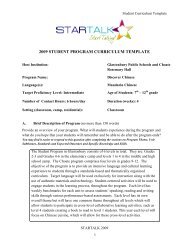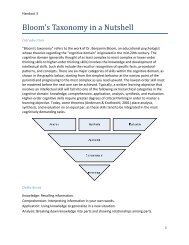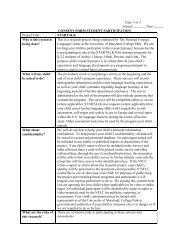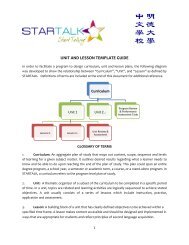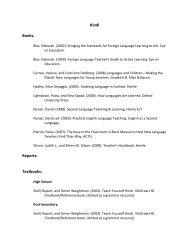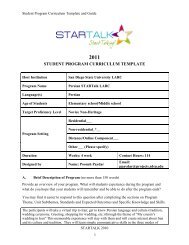Assessing Interpersonal Communication - StarTalk
Assessing Interpersonal Communication - StarTalk
Assessing Interpersonal Communication - StarTalk
You also want an ePaper? Increase the reach of your titles
YUMPU automatically turns print PDFs into web optimized ePapers that Google loves.
<strong>Assessing</strong> <strong>Interpersonal</strong><strong>Communication</strong>Laura Terrill
lauraterrill.wikispaces.comLaura Terrill
Laura Terrill
Three Modes of <strong>Communication</strong>InterpretivePresentational<strong>Interpersonal</strong>Laura Terrill
What is the mode of communication?123Prepare a poster about yourfavorite sport.Watch a travel video and jot downplaces of interest.Talk about what to do on theweekend.4 Send a letter to an e-pal.5Create a graphic organizer for newvocabulary.PresentationalInterpretive<strong>Interpersonal</strong><strong>Interpersonal</strong>Interpretive6Create a skit where you buysomething in the market.PresentationalLaura Terrill
<strong>Interpersonal</strong> Mode of <strong>Communication</strong>:Students engage in conversation, provideand obtain information, express feelingsand emotions, and exchange opinions.• The active negotiation of meaning among individuals.• Participants observe and monitor one another to seehow their intentions and meanings are beingcommunicated.• Adjustments and clarifications can be madeaccordingly.• Participants need to initiate, maintain, and sustain theconversationSource: Standards for Foreign Language Learning in the 21 st CenturyLaura Terrill
headfoothandstomacheyesnoseearsmouthkneehairLaura Terrill
Proficiency?List 10 parts of the body.What’s wrong? Do you have a headache?Conjugate the verb “to be”.You have a new dog! What’s he like?Use the future tense to say what you are going to do.What will you do next weekend?Replace the object with a direct object pronoun.When did you have time to read that book?Laura Terrill
<strong>Communication</strong>What does it mean to be proficient ina language?orHow will my students use what Iam teaching in a real-life context?orWill they really say it on the streetsof (Paris)?Laura Terrill
Strategies for Cooperative WorkThink - Pair - ShareThe teacher poses a problemor presents a topic. Studentsare given time to think and may beasked to jot down their thoughts or asked torespond individually using tools such aspolleverywhere. They then pair with another studentto discuss the topic or compare responses. Finally,they share their thoughts with the whole class.Laura Terrill
Strategies for Cooperative WorkNumbered Heads TogetherDirections: Students assemble intogroups and number off. The teacherasks a question and tells the groups to put their headstogether to discuss it. The teacher calls a number andselects a group. The student with that number in that groupanswers. The teacher asks the students of the same numberfrom the other groups if they agree with the response or asksthem to elaborate on the response.Laura Terrill
Hungry Planet - EquadorLaura Terrill
Strategies for Cooperative WorkWorking with Random PartnersABCDInner/Outer CircleFour CornersRotating RowsLaura Terrill
T.A.L.K. ScoresT – talking in the target language, trying to communicate,the talk is relevant to the taskA – there is an acceptable level of accuracy, particularlywith regard to the objective of the lessonL – the student is listening to his/her partner and is ontaskK – the student is kind and cooperative, he does not killthe task, he works with his partner/group(Shrum & Glisan)Laura Terrill
T.A.L.K. ScoresCreate a chart that has a column for each letter across the topand the name of each student on the vertical column. Duringpair or group work, circulate and monitor individual students foreach aspect in a random fashion, but try to assess everystudent on each aspect at least twice over a set period of time.TargetlanguageAccurate Listens KindStudent 1 + + + +Student 2 √ - + +Student 3 - √ - +Laura Terrill
T.A.L.K. ScoresTeachers should try to assess each student over a twoweekperiod. Mark:— plus (+) if the work is excellent,— a check (√) if the work is good to fair— a minus (-) if work is needed.For each round of TALK, a student can earn 8 points.Teachers transfer that score to the grade book on a slidingscale.Laura Terrill
Student Can-do’sLaura Terrill
Self-assessmentI can say whatanimals Ilike/don’t likeand say why.I can count upto 30 animals.I can askquestions to findout more aboutanimals.I can saywheredifferentanimals live.I can namethings humansdo to hurtanimals.I can name thingshumans do to helpanimals.I can say whatdifferentanimals like todo.I can sing theanimal song bymyself.Laura Terrill
Teacher Observation Check ListLaura Terrill
Laura Terrill
Do you like ….I like….I don’t like….to run to play football to play ping-pongLaura Terrill
to run to play football to play ping-pongLaura Terrill
Laura Terrill
?Do you prefer (sport) or (sport)?I prefer….• Do you play (sport) in summer or winter?• What sport do you play?• What is the weather like when you play (sport)?• Are you good at (sport)? Why or why not?• When do you practice?• Where do you play…….?Laura Terrill
Tu aimes la ratatouille?Oui, j’aime la ratatouille parce que j’aime beaucoup les poivronsNon, je n’aime pas la ratatouille parce que je déteste l’ail.un repas français• l’aubergine• la courgette• le poivron rouge, vert,jaune• la tomate• l’oignon• l’ailLaura Terrill
Tu aimes la ratatouille?un repas français• l’aubergine• la courgette• le poivron rouge, vert,jaune• la tomate• l’oignon• l’ailLaura Terrill
Tu aimes …….. ?Laura Terrill
Tu aimes le plumpynut?un repas multi-micronutrient• L’avoine• Les graines detournesol• Les amandes• Le germe de blé• Le miel• Les fruits secsLaura Terrill
Qu’est-ce que tu préfères? Pourquoi?Laura Terrill
What movie and why?Laura Terrill
What’s for dinner?Laura Terrill
Brainstorming – words related to winter sportsLaura Terrill
BrainstormingProcedure:• 1 minute to generate an individual list• 1 minute to share list with a partner. Each personadds new words to the list.• Group students into group of 4, share and add.• Go around the room calling out one word per groupuntil all groups are out of words. Teacher records allwords on something that can be displayed.• Students pair - must create mini dialogue that seemsappropriate to the situation, no notes but may look atdisplayed words. Set time limit appropriate for level.• Students pair differently - same mini dialogue, list isnot visible.Laura Terrill
Develop the Role PlayYou are being interviewed for aposition as a camp counselor.Have a conversation in whichyou ask and answer questionsto:• find out what you would doeach day• explain what you really liketo do• justify why you don’t like todo somethingLaura Terrill
La Tierra está enfermahttp://www.youtube.com/watch?v=zlugcpczjhQLaura Terrill
The Earth is Sick – La tierra está enfermahttp://www.youtube.com/watch?v=zlugcpczjhQLaura Terrill
Talking aboutRealia….Pair students.Give them a timelimit and tell themto create aconversation thatincorporates theinformation foundin the document.http://www.trekmaroc.com/Laura Terrill
Maintain the ConversationStudents try to keep the conversation going on a single topic byasking questions and commenting on their partner’s responses.Each student has an envelope of questions related to the topic topull out when they get stuck. At the end of the time limit, studentswant to be the partner who pulled out the fewest questions,signaling the partner who best sustained the conversation.• What do you like to do?• What do you usually do in summer, winter, etc?• What do you do when you have an evening athome?• What is your favorite way to spend a Saturday?• What chores do you have to do at home?• When do you usually study?• How often do you fix dinner? What do youcook?Laura Terrill
Maintain the ConversationNo time to write the questions, use images.Laura Terrill
Raise the proficiency level……1. I wanted to...2. I felt bad when...3. I would have..., but...4. I was glad that...5. My parents insisted...6. I was annoyed...7. I didn’t get to...Find out what your partner did last night.Ask a follow-up question to get more details.Laura Terrill
Structured DebateImagine their lives.Where would you rather live and why?What might cause you to change your mind and why?Laura Terrill
Structured DebateWhat should be done to protect the environment?In your group discuss the following ideas. Add oneor two additional ideas to the list. Select your top 2ideas. Be certain that everyone in your group candefend the choices you made.• Increase the cost of gasoline by 50% to decrease consumption and topromote public transportation.• Limit all households to 2 cars.• Require all schools to reduce energy consumption by 10%.• Charge more for foods that most be flown in from other region/countries.• Require that all homes have solar panels.• Restrict the development of yards that must be watered and fertilized.• ?????Laura Terrill
Structured Debatehttp://1jour1actu.com/debat/Should begging be banned fromdowntown areas?Beggars are being banned from downtown areas. It’sagainst the law to beg in the streets or in publictransportation. If beggers are caught, they must pay a fine ofabout $75.00.Roles in the debate:•the mayor of the city•a beggar•a resident of the city•a representative of a foundation that helps the poorConsider:•the need to enact laws for public good•the need for food and shelter for the homeless/unemployed•the need to feel safe in the streets•where the beggars go when they leave the city•the impact of the current economic conditions on povertyLaura Terrill
• I think the author wroteit to teach us about…• One theme might be……• I think it means that….• In other words……• For example….• In the text, it said that…..• One case showed that…..• I would add that……• Then again, I thinkthat….Teach the Language ofDiscussion / Debate• I want to expand on yourpoint about….• In my life….• I think it can teach us….• If I were…., I wouldhave…• We can say that…..• The main theme/point ofthe text seems to be….How to Start Academic ConversationsJeff Zwiers and Marie CrawfordEducational Leadership/April 2009Laura Terrill
Scored DiscussionMove from: 1 – 3 – 5 Move to:Asks random questionsOnly answers thequestion askedResponds, but rarelyinitiatesComments are notrelevantFollows up with logicalquestionsContributes additionalinformationContributes personalinsights to enhancediscussion and draw inothersStays on topicGretta Murray, French Teacher, Medford, WILaura Terrill
Partner A: What is happening? Connect the images in anyorder and tell the story.Partner B: Ask questions. You want lots of details.Laura Terrill
Conversational GrammarTravel memoriesTwo students are reminiscing about what they did when traveling on thestudent trip last year. Ask and answer questions as you revisit specific details.You know that your teacher is eavesdropping. Add in a few details for herbenefit.Packing for a tripYou are packing for a trip. Your mom wants to make sure you’ve rememberedeverything. You know exactly how the conversation will go. It always happens.“Do you have your phone charger?” Yes, I have it, etc.Worry WartsYou are getting ready to travel overseas for the first time. Your friend hastraveled abroad before. You are the worry wart. Your friend tries to reassureyou, but occasionally takes delight in adding to your worries.Travel GurusYou are an experienced international traveler and have volunteered to answerquestions at a group meeting of adults who will travel abroad for the first time.Respond to their questions as you focus on what they will need to do to getready for thetrip.Laura Terrill
Summative Assessment - <strong>Interpersonal</strong>You have a chance to call or Skype your friend while both of you areon vacation. Based on the image you selected, have a conversationwhere you ask and answer questions as you:• discuss where you are and with whom• comment on the weather• discuss activities you like and don’t like whileon this vacation• comment on why you like/don’t like to travel• make plans to get together after vacationLaura Terrill
Summative <strong>Interpersonal</strong> AssessmentYou are attending a student United Nations event. The topic isfood and hunger. You will represent one country and interactwith others from other countries. Have a conversation whereyou ask and answer questions to discuss:• Where you live• Food likes and dislikes• Foods that you eat in your country• Healthy and unhealthy behaviors• Hunger issues where you liveimages: Healthy PlanetLaura Terrill
Vertical ArticulationInt. 5Int. 4Int. 3Int. 2Int. 1Novice 4Novice 3Novice 2Novice 1Laura Terrill
Laura TerrillWorld Language / ELL Consultant8529 Stark DriveIndianapolis, IN 46216Cell: 314-369-9678Home: 317-546-2626Email: lterrill@gmail.comlauraterrill.wikispaces.comLaura Terrill


